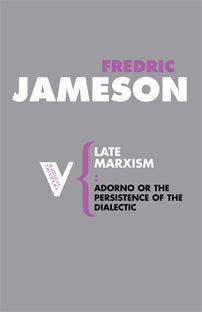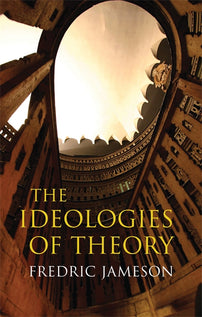Negative dialectics
C. D. Blanton reflects on Fredric Jameson's Late Marxism in part 7 of our Jameson at 90 series.

Philosophy, Adorno thought, ‘lives on because the moment to realize it was missed’ [ND 3; LM 48]. The suggestion formed a ‘complicated proposition’ [LM 113], as Jameson calls it, when first offered in 1966, splayed like some syllogism under the twisting pressure of Hegelian logic. In one world, the exhausted western one, philosophy had failed to actualize itself as real, as something more than philosophy, as Hegel had once insisted it must. Having failed to transfigure or negate itself, it remained merely philosophy.
In a second Soviet one, philosophy had achieved transfiguration of a sort, to be sure, remade as an official Marxism and as policy, but had slowly surrendered its claim on reason in the process. Having become too actual, too little rational, to function as philosophy, it lost its claim on actual existence altogether.
For a third and larger world, the moment of realization seemed not to have come at all, at least not yet.
The moment of 1989, as Late Marxism was written, complicated that proposition once again. Historically, it seemed to confirm a new and baleful (a word the text grimly intones) singularity, the apotheosis of late capital as bad infinity. In Hegel’s sense, taking ‘moment’ as a discrete disposition of possible dialectical shapes, each on the way to becoming false, having become momentarily true, the effect was equally baleful. The incipient disappearance of a socialism that had actually existed bore a strangely paradoxical effect of derealization. Meanwhile, a total system of endlessly predicated identities and exchanged values, the simple and absolute fact of ‘capital’ – insistently real, unarguably universal, forcefully determinate – can hardly be cognized, represented, mapped at all, as an identity of identity and difference, or as anything else.
[book-strip index="1"]
Philosophy thus missed its moment again, becoming newly false in its own way, becoming indeed only the latest and the most surprising industry to be rendered obsolete. Strangely, philosophy is realized as capital. Formal logic’s propositional trade in judgments of the true loses its power in the market: one little needs the concept’s labour to do what exchange value has already done, after all, positing the systematic terms of equivalence that make one thing the same as endless others. And, as for philosophy’s other great promise – of the ‘system’ as such, capable of synthesizing all those posited judgments – that too is achieved by other means, in the simple absolutization of the commodity form, capable of transposing the real and the rational in every transaction. It was Hegel who had insisted that logic and metaphysics are ultimately one, but it was late capital that vindicated the assertion.
Late Marxism, then, is both the methodological brief of Jameson’s later career and the necessary thought of an unthinkable situation: the mundane ineffability of late capital, with its own negative dialectic. Under Adorno’s name (or the sign of critical theory), it answers not to any of the more fashionable theoretical styles (from structuralism on) trading on the stock of pure difference, but to the need for a technique still capable of wielding philosophy’s tools to a different purpose. Late Marxism is thus, among other things, a figurative (and disfigurative) practice, designed to draw capital fitfully into provisional representability, to force the display of a mode of production all but defined by the loss of visible emblems; a moment in which the dialectic of reason lingers but no longer does what it once promised to do, unfolding in the negative precisely because the dialectic of reification has had its way. That Adorno provides ‘a handbook and an operating manual’ [LM 50] to the banality of that postmodern plight is less some irony or apostasy than a confirmation of his essentially classical Marxism; the problem of the non-identical, it turns out, only reiterates Capital’s account of the commodity’s corrosively constitutive power for a moment in which political economy’s logic has enfolded logic as such.
[book-strip index="2"]
Indeed, it is just this implicit rehearsal of Marx’s discovery – that what philosophy took as identity is itself formally identical with relations of exchange – that bestows upon negative dialectics its critical power. In the half-rhyme (itself non-identical) between late capital and a late Marxism that persists as its critique, all of philosophy’s problems return as something other than themselves: causality as constellation; enlightenment as error or myth; nature as history. In the rhythm of that return, perhaps, lies the secret of Adorno’s own disconcerting contemporaneity (disconcerting to him or to us). But, most insistently, returns the problem of truth, of truth-content in false forms even: no longer in the simple figure of posited identity or empirical fact, but a truth bound in more complex relation to the constitutive untruth divulged in every proposition, every sentence. For Adorno, and in this for Jameson as well, the identification of truth with untruth entangles the techniques of critical theory with those of art, of the artefactual in general, of the constructed, the produced, the made. Art missed its moment too, and so it lives on as critique.
Anachronistic in its turn, the resolute modernism of Adorno’s notion of art imports a power of non-identical memory. Useless in itself, the artwork cryptically intimates the history or image of some use value or particularity otherwise lost to the commodity’s remorselessly assimilating power. Necessarily, such a work remains unequal to itself, referrable to no general category of ‘art’ or ‘the aesthetic’ for just that reason, condemned for Adorno to the tendential nominalism that leaves it bereft of ready meanings. In this respect, a certain version of the artwork has, from Beethoven to Beckett, only ever thought late capital in advance. In so doing, it has reconstructed philosophy’s method, in a radically altered technical key. For the tradition that Hegel and then Marx remade, philosophy named a practice of representing the given, an equivocating instrument of ‘picture-thinking’ [Vorstellung]. A late Marxism, a negative dialectic, unmoors the equivocations: non-identity (Jameson insists) as Darstellung, a method for thinking what’s not given, what’s not yet realized.
See all works by Fredric Jameson here. His new book, Inventions of a Present: The Novel in its Crisis of Globalization is out on May 7.
[book-strip index="3"]






